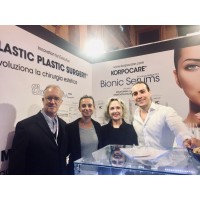7 MOTIVI PER EVITARE I SILICONI SULLA TUA PELLE
They could be holding you back from a healthy complexion.
No matter what your skin type, one of the ingredients I recommend avoiding is silicone. Or silicones, I should say because these slippery polymers go under dozens of different names, with new compounds being developed all the time.
That makes them hard to identify and even harder to avoid, as they've become the new normal in beauty formulations, from makeup to skincare to haircare.
Now, I don't think silicone-based eyeliners, mascaras or even lip colours are a big deal. But spreading silicones over the rest of your face may not be the best idea for a great complexion. Even silicone-based hair products can be bad news for your skin.
In this article, you will learn:
• Why beauty companies are really using silicones
• How silicones can affect your skin
• How to identify silicones on ingredient labels
• Where to consider eliminating silicones from your beauty routine
Why Beauty Companies Use Silicones
Here's why silicones have become so ubiquitous in beauty products:
They're safe (sort of)
Silicones are generally considered a low hazard for humans. However, according to Health Canada, some types of silicones (siloxanes) may be harmful to the environment and its biological diversity.
They're smoothing
Silicones give products a silky, spreadable, luxurious texture. They fill in crevices to make skin look and feel smoother which makes you think the product is "working," even though it's only a temporary, surface effect.
They're water-resistant
Hydrophobic silicones form a seal over the skin, which allows companies to claim longer-lasting (24 to 48 hours) "hydration" benefits. The same ingredient family is behind sweat-resistant sunscreens, and most makeup-setting sprays.
They're cheap
Let's get real. This is the main reason why silicones are everywhere! Beauty companies care more about the bottom line than actually helping your skin. They'd rather use cheap, man made plastics as fillers than formulate with more expensive raw materials that may have a shorter shelf life. But don't assume this means only drugstore brands use silicones they're to be found in even the priciest lines, which is particularly outrageous.
Reasons To Avoid Silicones
I eliminated silicones from my routine a couple years ago and my skin has improved so much! Here's why you may wish to do the same:
1. Silicones trap debris in your pores
Like plastic wrap, silicones form a barrier on top of your skin. That barrier can lock in moisture, yes, but it can also trap dirt, sweat, bacteria, sebum, dead skin cells and other debris along with it!
2. Silicones can cause acne and congestion
Prolonged exposure to oil, dead skin and bacteria underneath the semi-occlusive seal of silicones can lead to increased breakouts. If you are acne-prone, I consider silicones among the most important ingredients to avoid maybe even the most important. Silicones can also be a culprit in under-the-skin clogs (a.k.a. congestion), even if you don't develop full-blown acne.
3. Silicones can make your skin dull and dehydrated
Silicones could also be clogging your pores, but manifesting as dryness and dullness instead of acne. Not only do silicones prevent additional moisture from getting in, but the impacted materials can dehydrate your pores and throw your skin's natural regulatory processes off balance. The result? Your skin becomes less able to shed dead layers and hydrate itself.
4. Silicones interfere with cell renewal
Our skin renews itself every 28 days, whereby old cells are sloughed off and new cells make their way up to the surface. Silicones inhibit this process by slowing down the production of new cells and keeping dead cells stuck longer. Impaired cell renewal could decelerate the improvement of conditions such as pigmentation, redness, fine lines and scarring!
5. Silicones deliver nothing beneficial to your skin
When you use skincare products heavy in silicones, you're not actually hydrating or nourishing your skin, no matter what the label may claim it's simply a short term smoothing. (And a very lazy way of formulating, I might add!) As beauty consumers, we deserve higher quality ingredients that support skin health. Think: botanicals like aloe vera, and safe butters and oils such as shea and jojoba, for starters.
6. Silicones block other ingredients from absorbing
If you are layering products (which most of us do!), silicones can prevent them from doing their jobs properly. Let's say you use a silicone based micellar water or serum. Any moisturizers or treatments you put on next could have a diminished ability to penetrate, rendering them less effective. Heck, I even suspect that silicones probably impede the absorption of any beneficial ingredients within the same formula!
7. Silicones can be difficult to remove
The most common silicone, dimethicone, is extremely heavy and leaves a coating on the skin unless it is carefully removed. This is often why people see such a difference from nightly double cleansing, because it's properly removing the silicones from your skin a single pass with a regular face wash simply isn't enough! The same goes for silicone hair conditioners; even if you've rinsed with water, they can leave behind residue that triggers back and hairline acne.
How To Spot Silicones in Beauty Products
The easiest way to identify silicones on product labels is to look for words that end in one of these:
CONE
• Dimethicone
• Methicone
• Trimethicone
• Cyclomethicone
• Amodimethicone
• Trimethylsilylamodimethicone
SILOXANE
• Cyclopentasiloxane
• Polydimethylsiloxane
CONOL
• Dimethiconol
That should help you identify the vast majority of silicones in beauty products. However, I'm noticing an increasing trend toward using silicone ingredients that you might not immediately recognize. (This is what I mean about all the different identities these things go under!). You may wish to look for these names as well:
POLYMERS
• C10-30 Alkyl acrylate crosspolymer
• VP / VA Copolymer
• Polybutene
• Polyisobutene
Keep in mind, silicones can lurk in all of the following types of products:
SKINCARE
• Moisturizers
• Serums
• Face oils
• Sunscreens
• Face masks
• Face mists
• Acne treatments
• Anti-aging treatments
MAKEUP
• Foundations
• BB and CC creams
• Tinted moisturizers
• Primers
• Concealers
• Powders
• Blushes
• Setting sprays
HAIRCARE
• Hydrating shampoos
• Conditioners
• Leave-in conditioners
• Hair masks
• Styling creams
• Hair oils
Conclusion
I hope you'll agree that your skin is better off without silicones
Frankly, it really bothers me that so many beauty companies purport to be helping our complexions while cranking out these cheap formulations devoid of natural, nourishing ingredients!
Do I think it's a problem to use silicone based cosmetics for special occasions? No. But for a day to day basis, I'd really encourage you to find healthier alternatives, especially with your moisturizers and foundations.
7 Reasons to Avoid Silicones on Your Skin - Michelle Villett - Mar 28, 2017

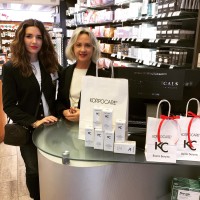
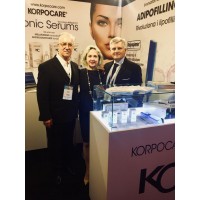
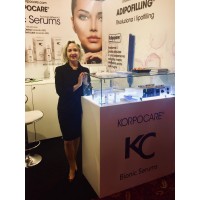
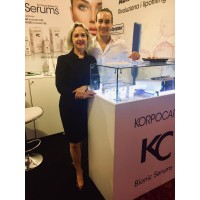
.jpeg)
